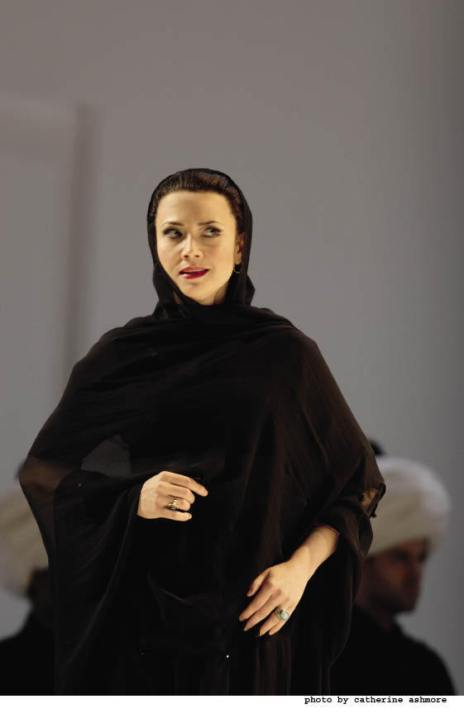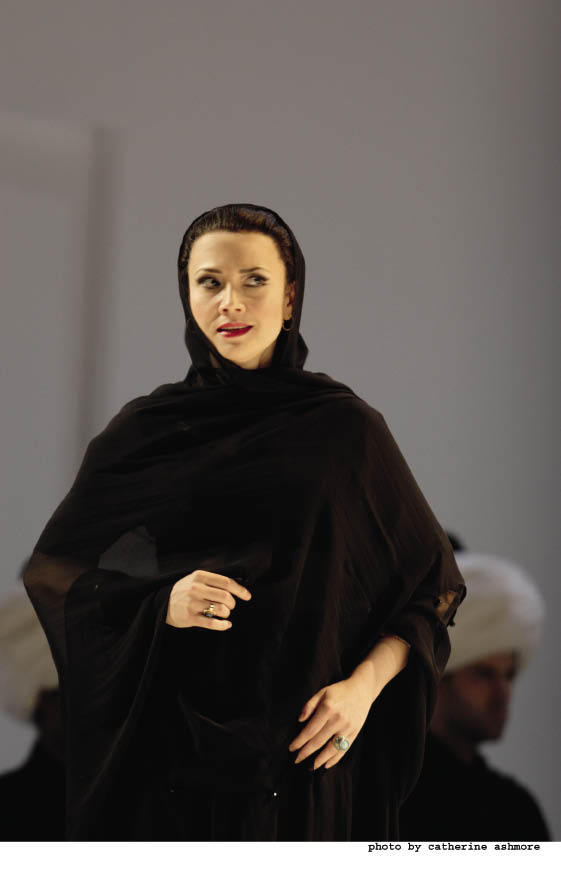Tamerlano
Royal Opera, in rep until 20 March
Handel’s Tamerlano is rated extremely highly by the cognoscenti, indeed routinely listed as being among his two or three greatest operas. I have only seen it twice, once at Sadler’s Wells nine years ago in a production by Jonathan Miller, conducted by Trevor Pinnock, and now at the Royal Opera in a production by Graham Vick, with Ivor Bolton conducting. On both occasions I have been bored to the verge of paralysis, but more so by the present one. It lasts from 6.30 until 11 o’clock, with two relatively short intervals. So it is as long as Die Walküre or Tristan, though they are always scheduled to start at 6 or even earlier. That does mean that the finishing time will put off anyone who doesn’t live in London and is dependent on public transport — an incidental blessing. But as I made my dazed way back to my King’s Cross Travelodge, I wondered why the Royal Opera does so resolutely restrict its possible audiences.
Where does one start? With the work itself, I suppose, but that is problematic: I have an old recording of it on LP, which is of course laughably inauthentic and shockingly cut, both of those being virtues in my book. At the Royal Opera it is complete, and the Orchestra of the Age of Enlightenment ensures authentic sounds so far as they can be ascertained. I have no idea how much is known about the speed at which recitatives were taken in Handel’s day, but Bolton has them at dictation speed, and since they are exceptionally copious in Tamerlano that accounts for a considerable amount of the pervasive lack of momentum, as they are musically mostly quite without interest. Bolton is also inclined to take arias at a slowish andante, apart from the few that evidently demand speed. As usual with Handel, though there are exceptions, the arias don’t serve to characterise; they express an emotion, or often two, but it could be anyone expressing it.
The characters are the auditory equivalent of stickmen. That is more than usually problematic in a work whose intentions are so unclear. That is partly due to the fact that Handel was so impressed by the tenor for whom he wrote the huge role of Bajazet that he added a considerable amount of music for him, including a protracted death scene which is much less affecting than one would expect. But it means that the opera is moved in the direction of tragedy, while the title role is surely at least to some extent a send-up of vindictive victoriousness. But Christianne Stotijn as Tamerlano, making her debut at the Royal Opera, hasn’t been given sufficient guidance, and veered between sending the role up and acting and singing with vicious intensity. Two stools have never been more completely fallen between. Stotijn is a singer I admire warmly, but she seemed uneasy in every way, and sometimes descended into hoarse barking in her lower register. And, like almost all the singers, she sounded underpowered in the large spaces of the Royal Opera.
The daughter of the captive Bajazet is Asteria, centre of romantic interest in the opera. Another singer to whom I’m devoted, another disappointment: Christine Schäfer spent the first half of the evening singing quite poorly, but improved immensely later, and provided some of the few engaging stretches. Her father Bajazet was to have been sung by Domingo in his tenorial farewell to the house, but in the event Kurt Streit performed the role, unfazed by its coloratura, and dramatically convincing, so far as the context permitted. He and the Andronico, Tamerlano’s rival for the hand of Asteria, were the most consistently satisfying performers: Sara Mingardo, also making her debut here, produced streams of rich, warm tone and looked magnificent — the costumes, grand 18th-century wear, are very fine. Yet by far the largest amount of applause was awarded to Renata Pokupic, in the small role of Irene, betrothed of Tamerlano, for her single aria, and one hopes she soon has a chance to sing a more substantial and rewarding part.
Could these puppets be brought to life? I think they could, but in a radically different style of production, which didn’t have mere traditional flouncing against a bare white background — I’m sure mine weren’t the only aching eyes by the evening’s end. Admittedly from time to time such extras as a life-size elephant, but blue and made of cloth, moved across the set, showing both Vick’s lack of confidence in the music, and his penchant for bemusing irrelevance. What is more serious, however, is the way in which he handles the relationships between the characters, as expressed in their gestures while singing or being sung to. Vick seems as uncertain as everyone on stage about whether this is a mixture of comedy and seriousness, as Giulio Cesare is, or whether it’s a long sceptical look at love and power. The audience can’t get involved, and it does make an excessively prolonged evening of vocal display.







Comments